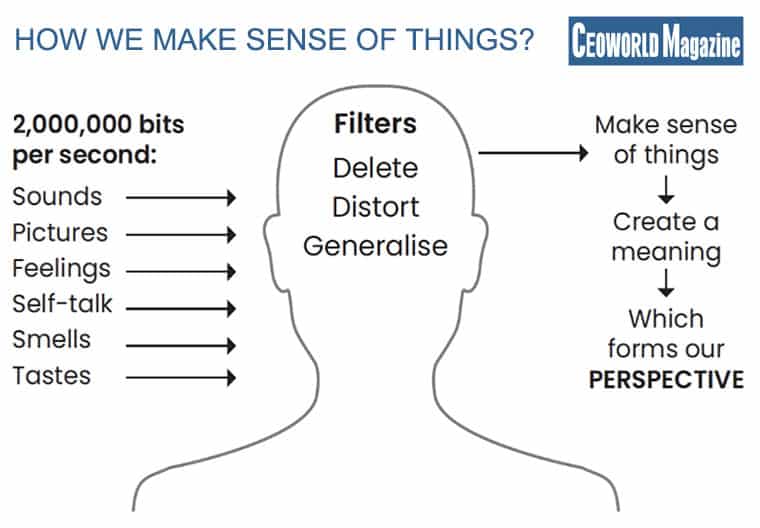Perspective is what makes the difference in leadership

Ever get into a heated debate about something being right? Perhaps, like me, you believed that if you swam within 30 minutes of eating you would develop a cramp and drown. Or maybe you believed that if you swallowed chewing gum it would stay in your stomach for seven years before it digested. And when you observed people around you swimming too soon or swallowing gum you would argue with them about how wrong it was. Perhaps you still find yourself arguing about things you believe to be right or wrong!
So, where did this notion of ‘right or wrong’ come from? As children we unquestioningly soaked up all the information being presented to us, through our parents, teachers and friends, often assuming that it was correct.
We started to form our own perspectives and decide what is right and wrong. But here’s the thing, there is no right or wrong! There’s just different. Different beliefs, different contexts, different values.
How we make sense of things
According to the neurolinguistic programming (NLP) model of communication, developed by Richard Bandler and John Grinder, we have around 2 million bits of information per second available to us at any given time. This information is presented through our six senses: auditory (what we hear), visual (what we see), kinaesthetic (what we feel), auditory digital (what we say to ourselves), olfactory (what we smell), and gustatory (what we taste).
Of all this information, we are only able to absorb around 134 bits per second, meaning that a lot of information presented to us is simply not taken in.

Our filters
How we determine what information we take in and what information we ignore will depend on what we believe to be relevant at any given point. And what we deem to be relevant will depend on past experiences and how we make sense of the world – in other words, we run filters. The filters we use:
- ‘delete’ information we don’t see as relevant at the time
- ‘distort’ information that we may not completely understand and make it mean something it’s perhaps not
- ‘generalise’ information by assessing it and putting it into a category that is easy to understand.
These filters allow us to be efficient, to make decisions quickly and effectively get things done. And the filters we use and how we make sense of the information creates our perspective – which isn’t necessarily true or false and isn’t necessarily right or wrong. It’s just different. Our perspective isn’t everyone’s reality, just our own.
Challenging our own perspective
For over thirty years I believed that if I went to bed with wet hair I would wake up with a cold – so I always dried my hair before bed. On another parallel I also believed that a cold was a virus that was passed from one person to the next. The two beliefs operated independently of each other, I never stopped to question my ‘wet hair’ belief. Then, a couple of years ago my sister came to stay with me, and was about to go to bed with wet hair. I said “dry your hair before you go to bed or you’ll catch a cold!”. She replied, “no I won’t, I’ve been going to bed with wet hair for decades and have never got a cold because of it”.
In that instance my perspective changed. I loosened my grip on ‘my way’ of viewing the world and suddenly I was experiencing things differently.
Perspective is in the eye of the beholder
If we can become ok with the idea that everyone thinks and experiences the world differently then our grip on what’s right and wrong loosens. The emotional connection we have with our own perspective decreases and we become curious about how other people experience the world. And when there’s no right or wrong, you are open to have a great conversation, learn about others and be curious.
In one of my leadership programs I give the group a universal statement “killing is wrong” which most agree as being a true statement. Then I ask them to each give me a different example of when “killing is right”. The responses I hear in the beginning are, “killing is right…
“when it’s to protect yourself”
“to put an animal out of misery”
“when it’s capital punishment for a crime”
“so we can eat”
As the common responses disappear the remaining participants are challenged to consider different ways of looking at the statement and get a little creative. The responses then evolve into “killing is right…
“when it’s a mosquito in your room in the middle of the night”
“for fun when playing a video game”
“when it’s turning off the music at the end of the night”
“when it’s ‘time’ that you’re killing”
“when it’s a cold or virus”
And the absolute best response I have heard from over 100 people who’ve taken part in this exercise is:
“killing is right when it’s spelt K-I-L-L-I-N-G”.
That is perspective at its best!
Regardless of what you think is wrong or wrong, true or false, when you are open to different perspectives, you learn to let go of the tight grip you have on your reality and start to appreciate the variety of different realities that exist. And when you do this, anything is possible. You can see that your options are endless and that rather than changing the people around you, you can simply change the meaning you’ve given something.
Written by Shelley Flett.
Have you read?
1. Experience Closely! 6 Tips To Travel Like A Local.
2. 23 Airlines That Have Gone Out of Business: Report 2018-2019.
3. Exciting Startup Ideas To Try In 2019.
4. World’s Best Fishing Charter Destinations, 2019.
5. 5 Skills You Should Focus On When Studying law School.
Bring the best of the CEOWORLD magazine's global journalism to audiences in the United States and around the world. - Add CEOWORLD magazine to your Google News feed.
Follow CEOWORLD magazine headlines on: Google News, LinkedIn, Twitter, and Facebook.
Copyright 2025 The CEOWORLD magazine. All rights reserved. This material (and any extract from it) must not be copied, redistributed or placed on any website, without CEOWORLD magazine' prior written consent. For media queries, please contact: info@ceoworld.biz








